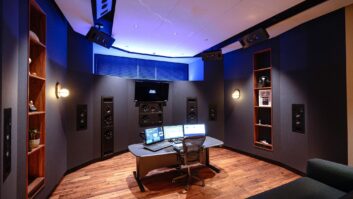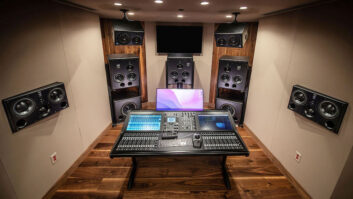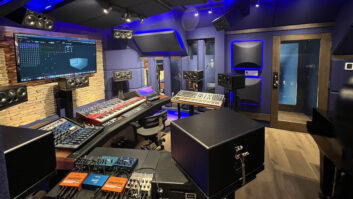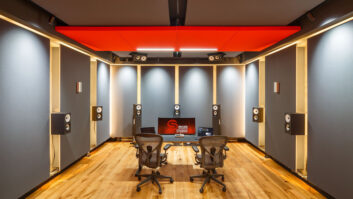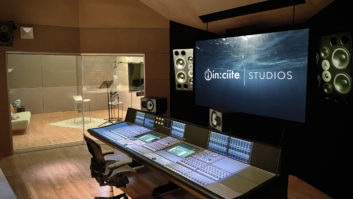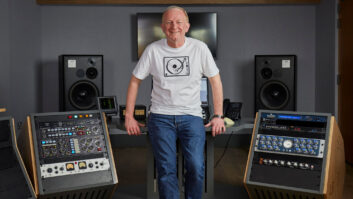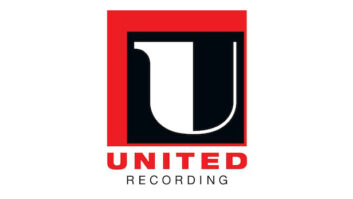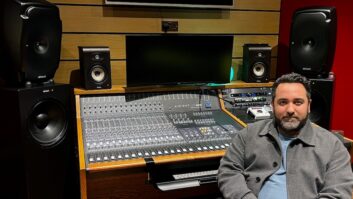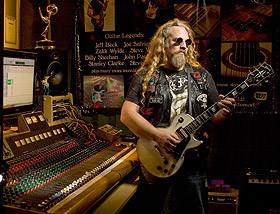
Brian Tarquin in his Jungle Room space
Photos: Erik Christian Photography
Emmy Award–winning guitarist, composer and producer Brian Tarquin parlayed more than 20 years of experience in producing original music for libraries such as FirstCom, Megatrax, Sonoton, One Music, Killer Tracks and 5th Floor Music (ABC-TV) into creating TVFilmTrax.com, his new online production music library offering downloadable tracks to media professionals for licensing. The TVFilmTrax catalog encompasses a variety of contemporary genres, plus Tarquin’s Classic Rock series of cover tunes (including Led Zeppelin, ZZ Top and Eric Clapton) and Guitar Masters series featuring the likes of Jeff Beck, Allan Holdsworth, Steve Morse, Joe Satriani, Steve Vai and more.
Tarquin designed the TVFilmTrax.com service for music supervisors, editors, producers and directors who often need new production music immediately. It uses the Soundminer audio search engine to facilitate quick, efficient searches that accommodate a broad range of terms, such as BPM, genre, style, instrument, sound type, key and composer.

Tarquin’s Trident Trimix console and outboard equipment rack [at left].
“What’s wonderful about broadcasters is that they’re constantly looking for new music because they always have new productions,” Tarquin says. “I thought the whole scenario of an iTunes for the TV/film industry would work out quite well.”
In addition to launching TVFilmTrax, Tarquin also spent 2011 relocating his Jungle Room Studios from Nyack, N.Y., to a 200-year-old farmhouse about 100 miles northwest of New York City. “I grew up in this house,” Tarquin says. “My parents sold it a decade ago and we just bought it back from the person they sold it to.” Tarquin has owned and operated Jungle Room Studios as his private facility for more than 20 years—first in Los Angeles, followed by Nyack and now in The Catskills—where he has produced music for a long list of major television shows (All My Children, Bones, CSI Miami, CSI New York and NUMB3RS, to name just a few), most recently Extra and TMZ. He also produces his albums as well as for artists such as guitarists Zakk Wylde, Billy Sheehan and Jeff Beck.
Mix recently caught up with Tarquin to ask him about his latest endeavors.
When did you launch TVFilmTrax?
I launched it in the last quarter of this year [2011]. We’ve been putting together all of the data and everything. It requires a lot of publishing information and metadata, so I have to get all that together before I can launch it because it has to be registered with ASCAP, BMI and SESAC.
You’ve gone from being an independent composer to owning a company through which you can sell and distribute all of your products.
Right. And through all those years, I made a lot of contacts, I know a lot of the music supervisors, so it helps. And it helps to have worked for a lot of these music libraries, too, because you understand it and you know how it works, and to know the [performance rights] societies and how it works, and obviously the people who run the music supervision and music editing.

Jungle Room Studios’ Sony APR 5003 2-track, 2-inch tape machine (at left) and Ampex MM 1200 24-track, 2-inch tape machine.
What inspired you to develop and launch your own production music service?
I’ve written for so many different libraries, and I always realized what a great [service] a library can deliver to TV and film, and through technology it’s gotten to be a lot easier because, quite simply, everything is downloadable now. With TV and film, especially TV, they need [music] so quickly and immediately that being able to log into a portal that they can search quickly and take what specific tracks they need and download [them] immediately is better than mailing any CD overnight.
I thought, ‘Well, this is a great [time] to come out with a library that would be just downloadable.’ It could be [searched by] typing in a style of music, like “hard rock” or putting in a description of music like “adventurous” or “comedy” or even “greed.” The software is so flexible that immediately it will pop up so many different songs. And you’re not dealing with a large library where you would have tens of thousands of CDs to go through. What producer has the time to go through 15 CDs with 99 tracks on them each? In a matter of minutes, they can find what they need, download it and off they go.
A lot of the larger companies will have CDs that go back into the ’70s, which probably a lot of people are not using; for TV, they want to be on the cutting edge of what’s new and hip, and what’s just been released. Many people are just looking for the newest thing, so for them an old catalog probably becomes a moot point. I think if somebody’s looking out for a real Honduras heritage song, they’ll obviously go to Sonoton or something like that, but we can supply a lot of the contemporary tracks.
We have a classic rock series, too. A lot of times, a production company won’t have enough money to get a Led Zeppelin song because Atlantic is going to want so much for the masters. In this case, we own the masters so that particular scenario would [involve] a special license. We have everything from chill and the Asphalt Jungle [electronic music tracks] to basic blues, jazz, acid-jazz, to drama and comedy, and things like that.

Jungle Room Studios houses Tarquin’s extensive collection of guitars.
Did you feel that now is a good time to launch your own library?
I think for me it was a good time because I wound up having this huge catalog of thousands of songs that I have done through the various styles through all these years. And then through having the [BHP Music] label, we have gotten so many submissions with product and so forth that it seemed like it would probably be a good time to be able to launch something like this, because when you think about it, even just five years ago, you would have to press all these CDs and that gets costly. I thought I’d wait until the time is right where we can launch something online. I was able to get everything together this year to be able to launch it.
I’d like to ask you about moving Jungle Room Studios. How did that come about?
My parents had a house up in The Catskills in New York. It was like a weekend getaway house that we had for 35 years, because I grew up in the city and we came up here on the weekends and summers. It was a 36-acre farm and a 200-year-old house. It was fun. [When I was] a kid, we’d always come up here and actually we had band practices here. So I was able to get it back from the woman who bought it from my mom when my dad died about 10 years ago. We just got it, and I thought, ‘Wow, this would be great for a studio space.’
So I came back here earlier in the year and basically set up the studio and started around that same time with working on tracks for the library and also for the album I’m currently doing, Guitar Masters Vol. 5.
There was a large area of one side of the house that’s kind of like a sun porch, and I put the control room in there. I have another room with a glass in between the rooms where I made the live room.
It’s a pretty big house. There are 16 rooms altogether. They’re not huge rooms because back then it was a farmhouse, so they made the rooms a little smaller. But still, it’s enough space for the kids and everybody to wander around, and we’ve got a lot of acres so they can run around and tackle each other [laughs], so it’s cool.

Tarquin keeps his amp heads in the control room.
Did you face any special challenges?
The one room with the control room, they probably put that in in the ’40s or the ’50s, so that’s not quite as old. The other part of the house, the living section, is much older. It actually all worked itself out pretty easily; I didn’t have to do too much other than the glass and address some reflection [issues]. But all in all, it’s a great workspace. It’s nice because you have these huge windows in here. You’re so accustomed to working in the dark in studios. [Laughs] So during the day when the light’s out, it’s nice to have a little light instead of being a studio rat locked up in the dungeon. I had to get the electrical done, get everything isolated. That’s always the first thing I do with a studio. It’s clean electricity; I can turn it way up and there’s nothing in there, no hiss at all, so everything’s isolated pretty well.
So you have a control room and a live room, and an amp room?
It’s an isolation booth that I built. I put all the amps in there. I have a Marshall cabinet in there and a few legacy cabinets, and some Fenders and things. I have an amp switcher in the control room so I can have eight amps that go to any eight cabinets or speaker enclosures. It’s so convenient in that you don’t have to get out and rewire things, because you lose that momentum of creativity when you mess around with all of that. I can just choose whatever amp I need for a session and just be able to lift two switches and go wherever I need to go. I try to keep all the amps together so I can listen to what I have.
I’ve got a Trident 70 Series mixer; it’s a 32-input with a TT patchbay and everything. For records and the Guitar Masters series, I always record everything on 2-inch. I have an Ampex MM 1200, a 2-inch/24-track. I record everything on there; I’ll do all the basic tracks, like drums, guitars. I’ll try to leave it in that [analog] format, and if I get a track from another guitarist, I’ll fly it in and that’s when I’ll dump it down to Logic or Pro Tools. From there ,I’ll mix to half-inch.

Another view of Jungle Room Studios’ Trident Trimix console.
I write for Extra and TMZ, and I’m actually in the middle of doing a session for them, a bunch of rock cues. I’ll do everything in Pro Tools, and then once I get everything approved, I’ll do all the final mixes down to quarter-inch and I’ll back it up on disk. I’ll put that down and it makes that much more of a [sonic] difference: There’s a fatter 3-D kind of tape sound. So I even do that with the cues; I’ll just punch that down to quarter-inch and then I’ll put that on their FTP site.
So you strongly prefer an analog sound.
Yeah. It even makes a big difference if you’re just doing Pro Tools with Logic and you’re going through an analog desk, as opposed to just mixing all in the box.
With Pro Tools it depends. If I do some album tracks and I’m going to track them all on analog and bounce them down to Pro Tools, I’ll probably just clean [them] up, and the only thing I’d really be doing is flying in a track that somebody sent me. So if Zakk Wylde sends me a track, I could fly it in that way. Other than that, I’ll try to leave everything on. If they come to the studio, then I’ll just mix it right down from 2-inch to half-inch. But sometimes it’s nice to track it all, as much as you can, onto 2-inch, bring it into digital format and be able to clean it up, and then you can mix them there. So it’s kind of the best of both worlds. With a lot of the TV stuff, I’ll just do it in Pro Tools because I know that there will be changes. I find that with TV cues, it’s best to stay in the digital domain because I can have endless tracks, and I can also edit anything I need to.
How are things going with Guitar Masters Vol. 5? Is that in progress?
Yeah. We’re in progress right now. We have a Joe Satriani track scheduled on that one. We have Hal Lindes from Dire Straits, Gary Hoey, Billy Sheehan, Zakk Wylde. So we’re going to have some fun tracks on this album. I’m recording all the basic tracks here and then I have them come here or I send them a rough mix of the song and they’ll put their parts down, and they send it back to me and we’ll fly it in. Like I was saying, we’ll take it off the 2-inch, all the tracks, and put them into Logic and then I’ll fly in their parts.
That’s a similar process to the previous album we talked about, the Les Paul tribute (Guitar Masters, Vol. 4).
Yeah. Some of them are out on tour and can’t come here. Then the guys that come here, they can lay down the tracks themselves, like Randy Kovins, Leslie West. And I think Hal Lindes might be here, and Andy Timmons. It will be a fun project. It’ll be released at the beginning of the year, in the first quarter. We’re just cutting the tracks now.
